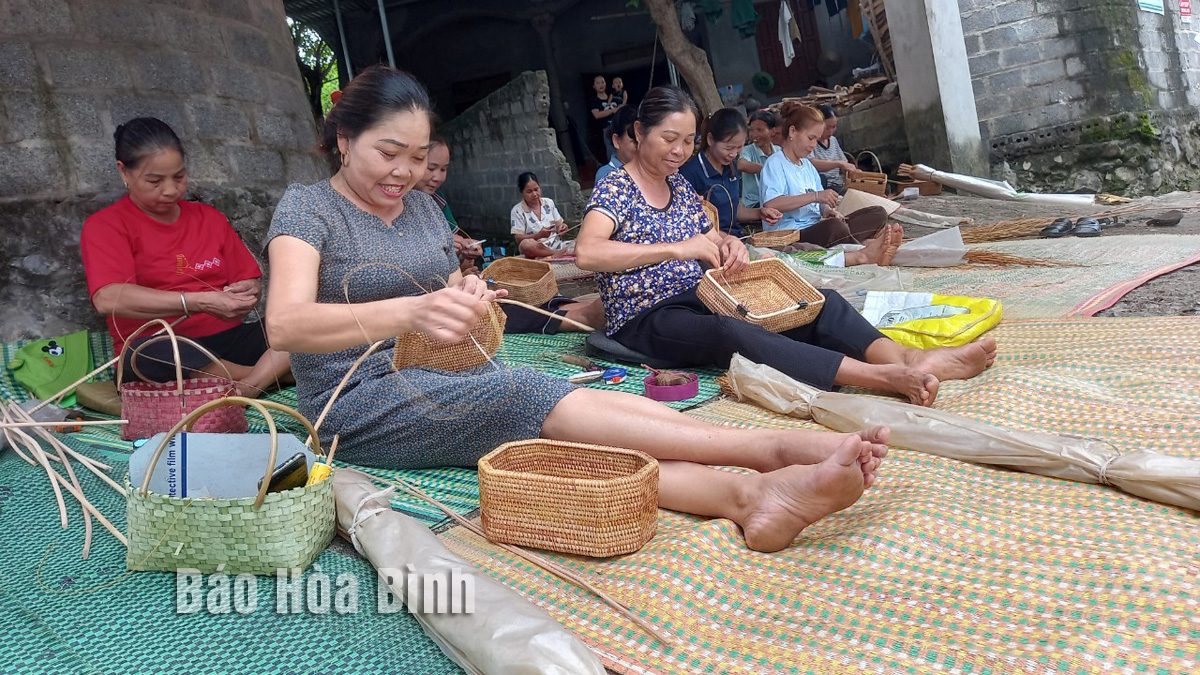
Over recent years, the People's Committee of Lac Son district has implemented various policies to support vocational training in traditional industry cooperatives, especially in ethnic minority areas. As a result, many households have get rid of poverty. Vocational training and startup support projects have also helped create numerous new jobs, increase income for workers, improve living conditions, and create conditions for sustainable development in the ethnic minority areas of the district.

Handicrafts create
jobs for many women in Tre village, Van Nghia commune, Lac Son district.
The culture house in Tre village, Van Nghia commune, Lac Son
district, is now a site for making bamboo and rattan products of the Muong Pheo
Agricultural Trade and Service Cooperative. Every day, about 20 local women
gather here to make handicraft products.
Nguyen Thi Trang in Tre village said that bamboo and rattan
weaving is a traditional craft in the village. In addition to farming, local women
teach each other the craft and then do it. Since the establishment of the
cooperative, they do not have to worry about finding raw materials and selling
products, but just follow the samples. Recently, the demand for handicraft
exports has risen, with increases in orders, so the work has become regular.
For normal workers, in addition to housework, they can each earn 4-5 million
VND (160-200 USD) a month.
Bui Van Lieu, Chairman of the Van Nghia commune People's
Committee, said that currently, the commune has more than 1,600 households with
over 7,000 members whose livelihoods mainly depending on agriculture.
Therefore, expanding the scale of the cooperative, creating jobs, and
increasing income for women are priorities of the locality. The handicraft industry
has generated jobs and helped raise income for many women in the commune. To
encourage the development of cooperatives, local authorities have also created
conditions for them to borrow capital.
In Nhan Nghia commune, the provincial People's Committee in 2017
recognised the Bui traditional craft village, and provided funding to restore
and develop the craft. In 2020, the Bui traditional rattan and bamboo craft
village cooperative was established with 25 members. Since then, local women
have had a more stable source of income, which helps improve their families’
living conditions.
Hoa Binh province is undergoing a dynamic transformation amid Vietnam’s national digital transition. Building on Poliburo’s Resolution No. 57-NQ/TW on breakthroughs in science, technology, innovation, and national digital transformation, the province has rolled out a wide range of practical action plans. A standout initiative is the "Digital Literacy for All” movement, an effort to ensure that no one is left behind in the digital era.
Hoa Binh province is undergoing a dynamic transformation in the wake of the national digital transformation movement. Building on Resolution No. 57-NQ/TW of the Politburo on breakthroughs in science, technology, innovation, and national digital transformation, the province has implemented a wide range of practical action plans. A standout initiative is the "Digital Literacy for All” movement ambitious effort to ensure that no one is left behind in the digital age.
With a spirit of unity and proactive problem-solving, the Party Committee, the government and the people of Dong Lai Commune (Tan Lac District) have made great strides in implementing the resolutions of the 24th Party Congress of the commune for the 2020 - 2025 term. Focusing on leadership and practical actions, the commune has brought the Party’s resolutions into daily life, creating strong impacts and pushing the local development forward.
Amid the nationwide push for digital transformation, young people in Hoa Binh Province are stepping up as dynamic pioneers, applying technology to enhance Youth Union operations and expand the reach of youth-led initiatives. Through creativity and adaptability, Youth Union organizations at all levels have introduced a series of practical solutions, contributing to modern governance and community development.
In recent years, An Nghia commune, located in Lac Son district, has stepped up administrative reform, focusing on improving the quality and efficiency of its single-window service unit for receiving and processing administrative procedures. These improvements have helped create favourable conditions for local residents and organisations to handle administrative procedures, contributing to the commune’s broader socio-economic development.
The Prime Minister-approved master plan to develop the multi-use value of forests ecosystems through 2030, with a vision to 2050, aims to improve the management and sustainable use of forest resources, create jobs, increase incomes, and improve the living standards of ethnic minorities, people in mountainous and remote areas, forest workers and those living near forests.



